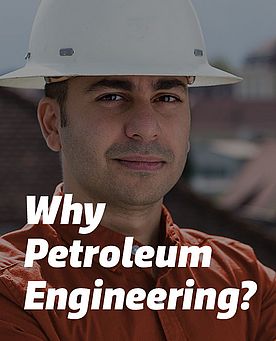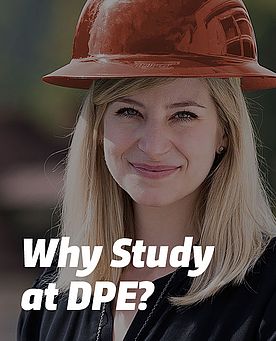Earn a Master of Science in Petroleum Engineering
The master program at DGE enables you to manage the increasing complexity of projects in the petroleum industry and to achieve excellent results based on your broad education.
After the first semester covering the advanced petroleum fundamentals, you can choose one of these four focus areas:
- Geothermal Engineering
- Petroleum Production Engineering
- Reservoir Engineering
- Drilling and Completion Engineering
You will spend the 2nd and 3rd semester in one of the four specific ’Master Classes’, getting an own workspace for one year where you are trained and supported by DPE lecturers as well as industry experts for the challenges in their future careers.
Full-time program
Classes in English
Starts Oct 1, 2025

1st Semester
2nd & 3rd
4th Semester
1st Semester: Advanced Fundamentals
Petroleum Exploration, Well Placement & Field Development
The master’s program includes advanced concepts in the Petroleum Engineering domain that basically intend to deepen your knowledge but also require lateral thinking. You will apply your knowledge in projects that are done individually and in groups to train not only your technical skills but also your team skills, which is essential once you enter the professional world.
Geomechanics, Geophysics & Geomodeling
Now that you know how Earth was formed and what are the principles of fundamental geosciences is time to focus on our field of study, Petroleum Engineering. In Geophysics, you will obtain a deeper understanding of the capabilities and limitations of wireline logs and become familiar with the evaluation of reservoirs. Geomechanics is an area where you will comprehend the pressure and stresses behavior around the well.
HSE, Economics & Project Management
Key for your future work is safety. Health, Safety and Environment is the subject where you will learn everything what you need to know about the Austrian, European and International regulations and technical standards concerning these matters. Economics and Project Management will be more detailed than they were during your bachelor program.
2nd & 3rd Semesters: Master Classes
Now it is time to specialize on your favorite focus area. You will spend a year in the respective master class, together with your colleagues. A maximum of 25 of you are educated in each master class per year where full academic support of our scientists and infrastructure are provided to you, including a permanent working space. Apart from laborartories, all courses are taught in those rooms, mostly in the form of blocks.
Drilling & Completion Engineering
Advanced courses in the drilling master class will cover everything you will need in your toolbox as a future drilling engineer. For instance, Advanced Drilling Technology, Well Control, Drilling Process Evaluation and Planning and Advanced Well Monitoring will provide you the skills you need to have in order to drill complex wells and control the wellbore in critical situations. Additionally, you will also get a detailed insight into equipment, materials and procedures on a drilling rig.
Reservoir Engineering
During this year you will be immersed in lectures where you will acquire knowledge regarding advanced reservoir engineering concepts such as geostatistical modeling, enhanced oil recovery, special core analysis among others. You will get in touch with specialized software used by international companies for modeling and simulation and also you will have the opportunity to run tests in laboratories which will let you understand and see real physical phenomenon’s in live action.
Production Engineering
Tough oil price scenarios push the oil and gas industry to concentrate on optimizing the production from existing wells. The core disciplines you will face are on one hand, the increase of the well lifetime by improving flow assurance of wells and production data management for understanding the behavior of your fields. On the other hand, reducing the operational expenditures by using optimized artificial lift systems, energy efficient processes and alternative materials is another challenging topic.
Geothermal Engineering
In this focus area, technologies and techniques used in the oil and gas industry are transferred to the geothermal energy recovery industry. If you are a Petroleum Engineer, and you are also interested in alternative sources of energy, this elective course will fulfill your expectations. Reservoir Simulation Methods for Geothermal Engineers, Geothermal Reservoir Modeling, Principles of Shallow and Deep Geothermal Energy Recovery and Thermodynamics, and Advanced Geothermal Drilling and Completion are some of the lectures that will be covered during the academic year.
4th Semester: Master’s Thesis
During your last semester you will work on a thesis to confirm your petroleum engineering skills by applying and linking all the knowledge that you have gathered during all these years. You will defend your master’s thesis and finally obtain a Master of Science in Petroleum Engineering degree from Montanuniversität


